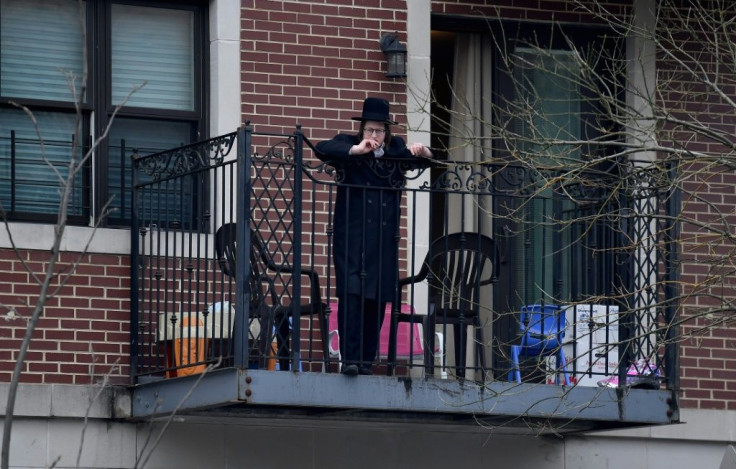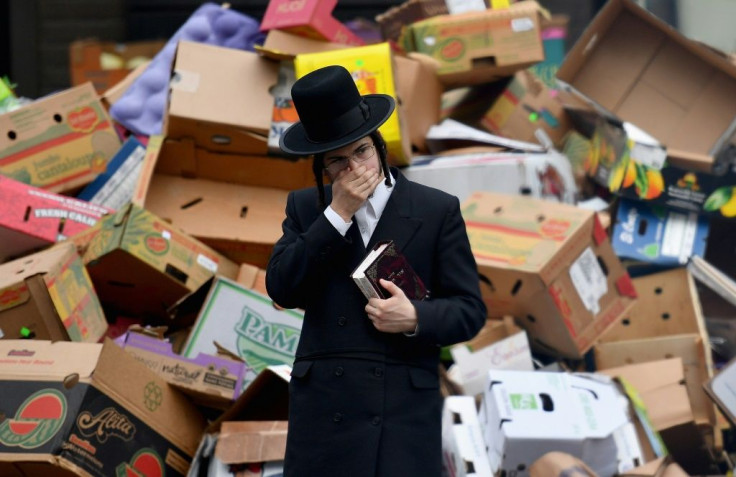'Seder In Place': New York Jews Observe Passover Amid Pandemic

Matzah, wine and bitter herbs still flew off the shelves but hours before Passover the normally bustling streets of Brooklyn's Hasidic neighborhoods stood eerily quiet -- save for a somber funeral procession and the persistent wail of sirens.
With the coronavirus pandemic ravaging New York -- more than 6,200 people have died in the state -- Jewish residents are preparing to "seder-in-place" when the eight-day holiday that recounts the Hebrew exodus from Egypt kicks off Wednesday evening.
The scent of the traditional burning of chametz -- leavened products forbidden during the observant period -- wafted through the Hasidic zone of Crown Heights in the morning, ahead of the day's candle lighting just before sundown to commence Passover.
A few community members gathered at a distance to honor one of their most prominent rabbis, who died at 88 following coronavirus complications -- and whose funeral normally would have drawn a massive crowd.
With synagogues closed, social distancing mandates curtailing travel and the virus hospitalizing community elders, religious leaders warned of an "unusually hard" holiday to come.
Yigel Niasoff's in-laws live one block away from him in the neighborhood, which is home to the Chabad Lubavitch world headquarters, one of the globe's most prominent Hasidic sects.
They would normally join their younger relatives for the spring holiday, but this year they will remain separate.
His elderly mother will observe Passover alone: The 71-year-old contracted coronavirus weeks ago and recovered, but has been quarantining ever since.
"The Passover holiday is celebrated with friends and families," Niasoff, 45, told AFP from his balcony. "It's good times and a happy mood."

"Right now with the pandemic, it's a very, very sad time."
Along with Jewish leaders Governor Andrew Cuomo has emphasized "now is not the time for large religious gatherings."

"We've paid this price already. We've learned this lesson," he said, referencing the virus' rapid spread in March north of the city, hitting Jewish communities following Purim holiday celebrations.
Distancing is particularly difficult for deeply religious communities restricted during the holiday period from using electronics or technology, including phones, to reach loved ones.
Leaders elsewhere are promoting digital seders to connect friends and family online -- even the Rabbinical Assembly, an association of conservative rabbis, condoned streamed seders for this year only.
Manhattan resident Ruth Cohen called the concept of virtual seders "really strange" but perhaps more practical: "You don't have to have a big apartment and a lot of dishes," she said.
Meanwhile the Chabad Lubavitch movement told its followers "as tempting as it may be, the answer is no."

"Shabbat and Jewish holidays are a blessed respite from all digital connectivity," the guidance reads.
Niasoff said the only way forward is to "keep the faith," saying that "with happiness we can hopefully conquer this evil plague on us."
He said youth must carry the torch for their elders.
"This time we are the bubbes and zaydes," the father of four said, using the Yiddish words for grandparents, a demographic particularly susceptible to severe COVID-19 infections.
"Everyone has to do their part. I gave my kids a warning the other day, I want everyone to prepare nice stories for the Seder table... we'll make it happen, we'll make it exciting."
Though many businesses have closed or severely limited entrance into their shops, many were working overtime to ensure everyone could get necessary provisions.
Shlomo Raskin's six-decade-old fish market closed mid-March but has been arranging curbside pick ups and deliveries.
He said though locals were doing their best to support businesses he was still reeling from the loss of wholesale revenue from restaurants and hotels forced to cancel their Passover plans.
But "the larger community is trying to support each other" despite the grave circumstances," Raskin said.
"The whole world is one community now."
"Mitzvah tanks" -- mini-synagogues of sorts that rove New York streets reaching out to non-observant Jews -- converted their vans into matzah delivery trucks, dropping off handmade unleavened crackers on the doorsteps of those in need.
Jake Dell, the fifth-generation owner of New York's famed Katz's Delicatessen, said business remained brisk with people purchasing matzo balls, potato kugels and honey cakes for smaller dinners at home.
"We feed people... we're happy to keep doing that," he said.
Despite tough times Niasoff said staying vigilant to halt infections was key: "We have a commandment to watch ourselves... we have to protect our own body."
"Our body belongs to God," he said.
"We're guarantors for each other."
© Copyright AFP 2024. All rights reserved.





















